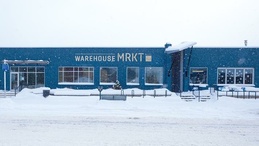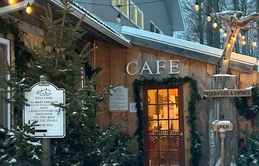Re-inventing the book store
March 15, 2009
In Ray Bradbury’s novel, Fahrenheit 451, the ‘firemen‘ of a fascist society in the near future have the task of burning books in an attempt to stamp out knowledge, truth and beauty. A few brave rebels save what’s left of literature by memorizing books and passing them on to their children by word of mouth.Gee, if only it were that simple.
Today’s bonfire is the digitization of books and the way that they are being sold online via amazon.com and Google. The trend is to live-stream books for sale over the Internet. Amazon.com has 240,000 books available for downloads, with hundreds of thousands more offered by Google.
These forces, combined with the recession and the fact that fewer young people are reading books, have put the beloved institution of the book store in peril.
Booksellers are wrestling with survival issues on par with those that are driving CD stores to extinction. Rolling Stone reports that 2,680 music stores have closed in the past four years, and the CD is on its way to oblivion.
One scheme would make books available for in-store downloads onto your iPod or reading device while you browse a much-reduced inventory on the shelves. Another idea being explored is to install in-store printers which will be capable of whipping up books while you wait.
The problem -- and one possible solution -- was outlined in a recent ‘open letter’ in the Ann Arbor Chronicle by Karl Pohrt, owner of that city’s Shaman Drum Bookshop.
Located just a few yards from the heart of the University of Michigan, with tens of thousands of students as potential customers, the Shaman Drum Bookshop is nonetheless in danger of going out of business after a 29-year-run. Pohrt noted in his letter that despite competition from amazon.com, Barnes & Noble and Borders Books, his store was still making a small profit until the university started requiring professors to post their textbooks online prior to the semester. Students stopped shopping at Shaman Drum in order to buy their books online. As a result, the bookstore lost $510,000 in sales last year.
Pohrt has come to believe that this is “the darkest hour“ for booksellers and that the business model for the book store needs to change in order to survive. “I (have) learned that every 500 years a major technological shift occurs,” he writes. “Five centuries ago Gutenberg invented (or perfected) moveable type. Now, with the digitization of print, we find ourselves in the middle of another sea change.”
Things are just as bad for Borders Books, which is also based in Ann Arbor. The chain, which owns 519 book stores, along with Waldenbooks and its 467 stores, is struggling to avoid bankruptcy. Its stock, which sold for more than $11 per share before the crash, hit a low of 35 cents in January.
Two weeks ago, Borders announced that it is closing its flagship store on Michigan Avenue in the heart of Chicago. The 49,881-square-foot store is arguably the Miracle Mile’s most important social institution.
The hope for Borders is that some stores -- including the Traverse City location -- will survive the collapse of the company in the wake of a possible bankruptcy.
Who are today‘s ‘firemen‘ torching the institution of the book store? We are. When you buy a book online, you vote against your community. When you buy a discounted bestseller at Sam’s Club or Walmart, you are killing your local book store. New schemes for live-streaming books via Google or amazon.com at cut-rate prices only add fuel to the fire.
Some might say, so what? When you can buy a used book at amazon.com from a reseller for $3 compared to $15 at your local book store, why shouldn’t you?
You might ask the same question of those millions of Americans who are now out of a job, yet have homes filled with Chinese electronics, clothes made in Honduras, and cars made in Japan... with virtually nothing made in America. When you don‘t buy local, the ultimate victim is yourself.
Fortunately, there is a strong “buy local” ethic in Northern Michigan, commonly shared among readers of the Northern Express. There is a segment of the region’s population who are committed to supporting our downtowns, farm markets, local boutiques, wineries and independent restaurants.
Add book stores to that list because they represent one of our finest local institutions, bringing people together to share ideas, poetry, workshops, music and book clubs.
As an author myself, I‘ve had a chance to observe the passion people have for our book stores during talks at the Horizon Books chain and at Boyne Country Books in Boyne City. Last week, I sat with a full house of high school and college kids in Horizon Books‘ basement, checking out an excellent free concert by songwriter Andrew Sturtz. And book stores such as the Higher Self in TC and McLean & Eakin in Petoskey offer workshops and book club events that breathe culture and ideas into the lifesblood of our towns.
By one estimate, book stores are 10 years behind the times in keeping pace with technology. But keeping up with technology isn’t likely to change the fact that more people seem to be interested in playing video game bastardizations of Lord of the Rings than they are in reading the book.
Ultimately, the way to save book stores might have little to do with technology, and everything to do with becoming a center of social activity in town.
Karl Pohrt believes that the salvation of his store is to have it declared a nonprofit organization, to be renamed the Great Lakes Literary Art Center. He hopes to surrender the Shaman Drum Bookshop to a board of directors and remain on as chief executive officer.
As a tax-exempt non-profit, the store will add more social events, such as author signings, workshops, book clubs, poetry readings, music and plays. Its earnings will be funneled back into the store to benefit the intellectual life of the community.
Could book stores be preserved as tax-free nonprofits with a new focus on culture and social events? There is certainly justification in preserving literature and the exchange of ideas.
Of course, some might claim that music and art supply stores should also be able to become tax-free nonprofits. Perhaps they do. In any case, the experiment in Ann Arbor bears watching if we want to turn the page on the future.
Trending

Farm to Glass with Ethanology
When Elk Rapids distillery Ethanology committed to locally-sourced ingredients for their products, it seemed like they&rsquo… Read More >>
MRKT HLDY SHPPNG, aka Warehouse MRKT Holiday Shopping!
Shop the latest from local makers and vendors at the Holiday MRKT Share at Warehouse MRKT in TC, Saturday, Dec. 20, from 10a… Read More >>
Men and Ugly Sweaters
Those two things don’t always go together, but on Dec. 19, you’ll see both out and about in Petoskey and Harbor … Read More >>


